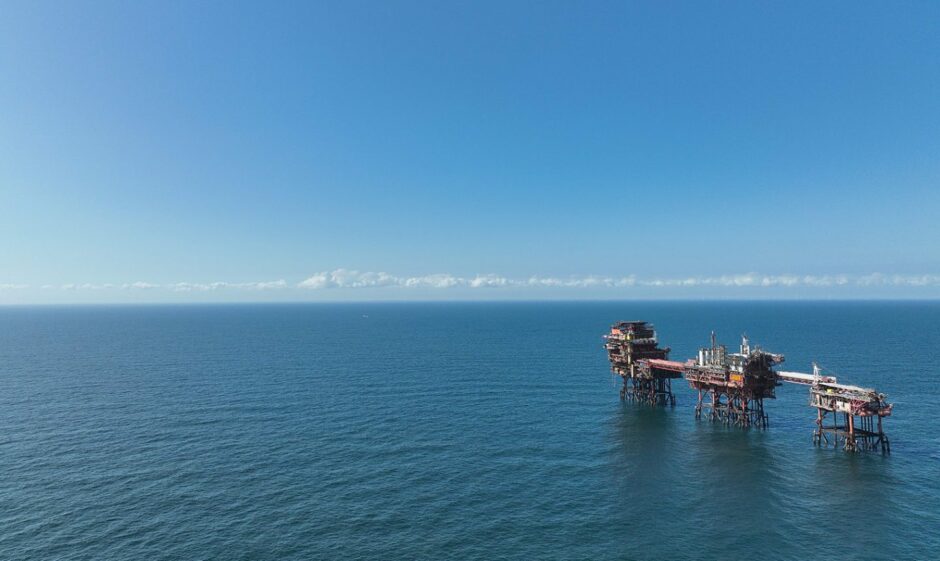
Centrica has begun decommissioning platform infrastructure at the depleted Rough gas field in the North Sea, off the coast of Yorkshire.
The decommissioning is not expected to affect either the natural gas or hydrogen storage capabilities at Rough, either now or in the future, according to a spokesperson.
Centrica intends to redevelop the gas storage facility at the depleted Rough gas field in the North Sea, which was decommissioned in 2017 and then reopened in 2022, into a hydrogen storage facility.
Last month, Aberdeen-based well and reservoir management company Exceed won a contract to redevelop the gas storage facility at the depleted Rough gas field to store hydrogen.
The Rough gas field, located off the coast of Yorkshire, was brought out of dormancy in 2022 following the UK’s energy crisis, which was precipitated by Russia’s war on Ukraine.
Centrica secured an extension to the gas field’s licence that year, which will last until 2030,the spokesperson confirmed, meaning it can continue to store natural gas at the facility until the end of the decade.
A spokesperson for the energy company told Energy Voice that it has the “cash to invest” in the £2 billion redevelopment of Rough, but that it requires a cap-and-floor subsidy to operate the field as a hydrogen storage facility.
The company declined to disclose whether this investment would be funded by cash on balance sheet or through debt and equity.
Rough Alpha
Centrica Energy Storage Limited has meanwhile lodged a draft decommissioning statement for the topsides and jackets of the Rough Alpha installation to the Department for Energy Security and Net Zero.
The Centrica spokesperson told Energy Voice that six subsea wells at the disused Alpha installation at the depleted Rough gas field have already been “plugged” and that “the decommissioning work is separate and has just started”.
Platform infrastructure will be dismantled at the 47/8A Alpha installation, which is located 29 km from the town of Easington in Yorkshire, where Centrica, Equinor and SSE Thermal plan to overhaul an existing gas terminal to store and transfer hydrogen.
According to Centrica’s website, the pipelines and subsea infrastructure are not included in the scope of the decommissioning of the platform.
According to a planning document, the original gas pipeline connecting the disused Alpha platform at the depleted Rough gas field to the Easington onshore terminal was first mothballed and replaced in 1988.
The document reads: “In 2019 all wells were temporarily plugged and disconnected from the platform process pipework, which in turn has been disconnected from associated pipelines connecting the 47/8A platform to the Easington Terminal and the 47/3B platform.
“All platform equipment has been de-energised, with the exception of navigation aids. The project was subsequently put on hold in 2020 due to COVID-19. The platform condition is periodically monitored utilising drone technology with any noted degradation of the platform structure reviewed and assessed as required.”
The separate Bravo platform at the depleted Rough gas field continues to be operational, the Centrica spokesperson confirmed.
On 29 November, Centrica said the gas field at Rough had started to pump gas into the UK transmission system “for the first time this winter” to manage demand caused by a cold snap and severe weather.
The gas field reached a record fill earlier that month, when it was the fullest it had been since its reopening in 2022. The storage site is filled with gas over the summer and withdrawn when demand is higher.
Hydrogen storage at the Rough gas field could save customers up to £1 billion a year on energy bills by 2050, according to a recent report by FTI Consulting and Centrica.
Centrica plans to store renewable electricity in the form of hydrogen in salt caverns at the converted Rough facility in the short term, and retrofit the existing storage capacity at the depleted gas field to store hydrogen over the longer term.
It has called for a ‘superhighway’ of hydrogen pipelines to be installed across the country that would involve retrofitting existing gas pipelines.
A report released by the North West Hydrogen Alliance in December urged the UK government to “prioritise developing hydrogen transport and storage” to help the energy sector scale and meet net zero targets. An economic impact assessment by the alliance estimated that the region’s hydrogen sector could generate up to £3.4bn for the economy by the end of the decade.
Recommended for you

